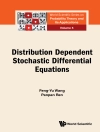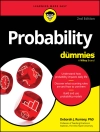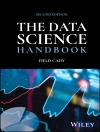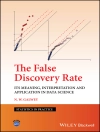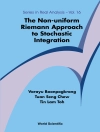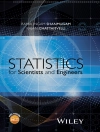This book is comprised of presentations delivered at the 5th Workshop on Biostatistics and Bioinformatics held in Atlanta on May 5-7, 2017. Featuring twenty-two selected papers from the workshop, this book showcases the most current advances in the field, presenting new methods, theories, and case applications at the frontiers of biostatistics, bioinformatics, and interdisciplinary areas.
Biostatistics and bioinformatics have been playing a key role in statistics and other scientific research fields in recent years. The goal of the 5th Workshop on Biostatistics and Bioinformatics was to stimulate research, foster interaction among researchers in field, and offer opportunities for learning and facilitating research collaborations in the era of big data. The resulting volume offers timely insights for researchers, students, and industry practitioners.
สารบัญ
Chapter1. Importance of Adjusting for Multi-Stage Design when Analyzing Data from Complex Surveys.- Chapter2. A selective overview of semiparametric mixture of regression models.- Chapter3. Estimating the Confidence Interval of Evolutionary Stochastic Process Mean from Wavelet based Bootstrapping.- Chapter4. A New Wavelet-Based Approach for Mass Spectrometry Data Classification.- Chapter5. Identification of Pathway-Modulating Genes using the Biomedical Literature Mining.- Chapter6. Equivalence tests in subgroup analyses.- Chapter7. Empirical Study on High-Dimensional Variable Selection and Prediction under Competing Risks.- Chapter8. Learning Gene Regulatory Networks with High-Dimensional Heterogeneous Data.- Chapter9. Discriminant Analysis and Normalization Methods for Next-generation Sequencing Data.- Chapter10. Rank-based Empirical Likelihood for Regression Models with Responses Missing at Random.- Chapter11. Nonparametric Estimation of a Hazard Rate Function with Right Truncated Data.- Chapter12. On the landmark survival model for dynamic prediction of event occurrence using longitudinal data.- Chapter13. Analysis of the High School Longitudinal Study to Evaluate Associations Among Mathematics Achievement, Mentorship and Student Participation in STEM Programs.- Chapter14. Optimal Weighted Wilcoxon–Mann–Whitney Test for Prioritized Outcomes.- Chapter15. Wavelet-based profile monitoring using order-thresholding recursive CUSUM schemes.- Chapter16. Bayesian Nonparametric Spatially Smoothed Density Estimation.- Chapter17. Nonparametric Estimation of a Cumulative Hazard Function with Right Truncated Data.- Chapter18. Mammogram Diagnostics Using Robust Wavelet-based Estimator of Hurst Exponent.- Chapter19. Statistical Power and Bayesian Assurance in Clinical Trial Design.- Chapter20. Predicting Confidence Interval for the Proportion at the Time of Study Planning in Small Clinical Trials.- Chapter21. Performance evaluation of normalization approaches for metagenomic compositional data on differential abundance analysis.- Chapter22. Statistical Modeling for the Heart Disease Diag-nosis via Multiple Imputation.
เกี่ยวกับผู้แต่ง
Yichuan Zhao is a Professor of Statistics at Georgia State University in Atlanta. He has a joint appointment as Associate Member of the Neuroscience Institute and he is also an affiliated faculty member of School of Public Health at Georgia State University. His current research interest focuses on Survival Analysis, Empirical Likelihood Method, Nonparametric Statistics, Analysis of ROC Curves, Bioinformatics, Monte Carlo Methods, and Statistical Modeling of Fuzzy Systems. He has published over 80 research articles in statistics, has co-edited two books on statistics, biostatistics & data science, and has been invited to deliver more than 170 research talks nationally and internationally. Dr. Zhao has organized the Workshop Series on Biostatistics and Bioinformatics since its initiation in 2012. He also organized the 25th ICSA Applied Statistics Symposium in Atlanta as a chair of the organizing committee to great success. He is currently serving as editor, or onthe editorial board, for several statistical journals. Dr. Zhao is an elected member of the International Statistical Institute.
Ding-Geng (Din) Chen is a Fellow of the American Statistical Association and is currently the Wallace Kuralt distinguished professor at the University of North Carolina at Chapel Hill. He was a professor at the University of Rochester and the Karl E. Peace endowed eminent scholar chair in biostatistics at Georgia Southern University. He is also a senior statistics consultant for biopharmaceuticals and government agencies with extensive expertise in Monte-Carlo simulations, clinical trial biostatistics and public health statistics. Professor Chen has more than 100 referred professional publications, has co-authored and co-edited six books on clinical trial methodology, meta-analysis and public health applications, and has been invited nationally and internationally to give speeches on his research. Professor Chen was honored with the’Award of Recognition’ in 2014 by the Deming Conference Committee for highly successful advanced biostatistics workshop tutorials with his books.





